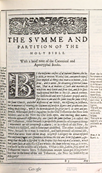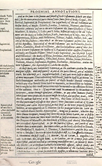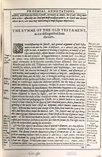With a brief note of the Canonical and Apocryphal Books.
§1. By the uniform consent of all learned Divines, the holy Bible, or written Word of God, containeth expressed or implied all things that man is to believe, to observe, and to avoid, for obtaining of eternal salvation. That is, all matters of faith and manners, by which we may know and serve God, and so be spiritually joined with him in this life, and in eternity. For both the old and new Testament propose and testify unto us one and the same God, the same Christ, the same Church, and other Mysteries of our belief, not differing in substance, but in manners of uttering; the Old more obscurely in figures and prophecies foretelling those things, which the New declareth (in great part) as done and performed. Whereupon saith St. Augustine: In the Old Testament the New lieth hidden; and in the New the Old lieth open. And touching their names, wherein appears difference, the one (saith the same Doctor) is called the old Testament, either because it proposeth promises of temporal things (wherewith our old corruptness is allured) or in respect of the New, by which it is fulfilled, and in some part abolished. The other is called the New, because by it man is renewed, and hath promise of eternal life, which shall never wax old nor decay. Likewise St. Gregory the Great testifieth this conformity and correspondence between the Old and New Testament, affirming that the same is signified by the Prophet Ezechiel’s vision of a wheel, which had four faces, or appearance of four wheels, the shape whereof was, as it were, a wheel in the midst of a wheel. What is this, saith he, Nisi quod in Testamenti veteris litera Testamentum novum latvit per Allegoriam? But that in the letter of the old Testament, the New lay hidden by an Allegory?
§2. And as the same is the sum and subject of both Testaments so both are divided (for the more principal parts thereof) into four sorts of Books: Legal, Historical, Sapiential, and Prophetical. The Legal books of the old Testament are the five Books of Moyses, Genesis, Exodus, Leviticus, Numeri, and Deuteronomy; whereto answer in the new Testament the four Ghospels of Saint Matthew, St. Marke, St. Luke, and St. John. Historical books of the old Testament are the Books of Josue, Judges, Ruth, four books of Kings, two of Paralipomenon, Esdras, with Nehemias, Tobias, Judith, Hester, Job, and two of the Machabees; unto which in the new Testament answer the Acts of the Apostles. Sapiential of the old Testament are the Proverbs, Ecclesiastes, Canticles, Book of wisdom, and Ecclesiasticus; and of like sort are in the new Testament the Epistles of St. Paul and of other Apostles. Prophetical books are David’s Psalter (which is also Sapiential, yea likewise Legal and Historical) the Books of Isaias, Jeremias, with Baruch, Ezechiel, Daniel, the twelve less Prophets, Osea, Joel, Amos, Abdias, Jonas, Michaeas, Nahum, Abacuc, Sophonias, Aggaeus, Zacharias, Malachias. And in the new Testament, the Apocalypse of St. John the Apostle.
§3. All these Books are undoubtedly Canonical, as the Authors cited in the inner margin testify. And consequently all, and all the parts thereof, are of infallible truth. For otherwise, as St. Augustin teacheth, if any part were false or doubtful, all were uncertain. Once admitting falsehood (saith he Epist. 8. ad. Jerom.) in such sovereign authority, no parcel of these books should remain, which any way should seem hard to manners, or incredible to believe, but it might by this most pernicious rule be turned to an officious fiction of the author. That is: If any error could be committed by the authors of Scriptures, either through ignorance, oblivion, or any other human frailty, whatsoever were produced, exception might be taken, and question made, whether the author had erred or not. True it is, that some of these books (as we shall particularly discuss in their places) were sometimes avouched of by some Catholics, and called Apocryphal, in that sense as the word properly signifieth hidden, or not apparent. So St. Jerom (in his prologue before the Latin Bible) calleth diverse books Apocryphal, being not so evident, whether they were Divine Scripture, because they were not in the Jews’ Canon, nor at first in the Church’s Canon, but were never rejected as false or erroneous. In which sense the Prayers of Manasses, the third book of Esdras, and third of Machabees are yet called Apocryphal. As for the fourth of Esdras, and fourth of Machabees there is more doubt. But diverse others, as the book ascribed to Enoch, the Ghospels of St. Andrew, St. Thomas, St. Bartholomew, and the like recited by St. Gelasius (Decreto de libris Ecclesiasticis dist. 15. Can. Sancta Romana) St. Innocentius the first (Epist. 3.) St. Jerom, Ep. ad Laetam, St. Augustine lib. 15. cap. 23. de civit. Dei, Origen homi. 2. in Cantica, are in a worse sense called Apocryphal, and are rejected as containing manifest errors, or fained by Heretics. Neither can a Christian Catholic be otherwise assured, which Books are Divine and Canonical Scriptures, but by declaration of the Catholic Church, which without interruption succeedeth the Apostles, to whom our Saviour promised, and sent the Holy-Ghost, to teach all truth. For if anything more than others, assuredly one chief and most necessary point is, to know and declare which Books are God’s holy word, being of most singular importance.
Margin Notes
- 1. How the holy Scriptures contain all knowledge necessary to salvation.
- 1. The old and the new Testament show the same God, Christ, Church and other Mysteries of Religion.
- 1. The old more obscurely, and with less helps.
- 1. The new more expressly and yieldeth more grace.
- 2. In both Testaments, are four sorts of Books.
- 2. Legal.
- 2. Historical.
- 2. Sapiential.
- 2. Prophetical.
- 3. All these books recited are Canonical, and of infallible truth.
- 3. Apocryphal of two sorts. 1. Not declared canonical. 2. Rejected as erroneous.
- 3. The Holy Ghost declareth by the Church which Books are Divine Scriptures.
Margin References
- 1. St. Jerom Epist. Ad Paulin. De omni. S. Scrip. libris. St. Aug. prefat. In specul. lib. 2. de doct. christ. ca. 9. Is. 1. de Gen conta Manich. ca. 4. lib. de catechis. rudib. ch. 3. & 4. lib. 2. qq. super Exod. q. 73. lib. 15. cont. Faust. Manich cap. 2. lib. 18. civi. ca. 54. de vera relig. ch. 27. lib. 4. cont. Faust ch. 2.
- 1. Hom. 6. In Ezech. 1.
- 3. Conc. Carth. An D. 419. Conc. Laodic cap. 59. Florent Instru. Armen. decres. 7. Trident Sess. 4. St. Atha. in Sin. St. Aug. lib. 2. doct Christi. ch. 8. Isidor. lib. 6. Etymol. ch. 1. & alibi. Nicep. l. 4. cap. 15. Euseb. lib. 5. c. 8. Mat 28. Joan 14, 16. Act. 2, 20. 1 Tim. 3.



